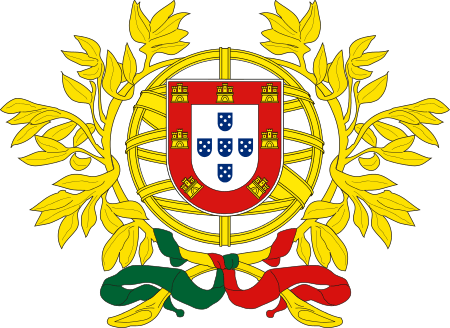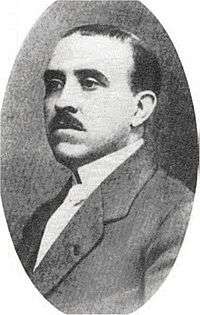1922 Portuguese legislative election
General elections were held in Portugal on 29 January 1922.[1] The Democratic Party emerged as the largest in Parliament, winning 74 of the 163 seats in the House of Representatives and 37 of the 70 seats in the Senate.[2]
| |||||||||||||||||||||||||||||||||||||||||||||||||||||||||||||
163 seats to the Chamber of Deputies 82 seats needed for a majority | |||||||||||||||||||||||||||||||||||||||||||||||||||||||||||||
|---|---|---|---|---|---|---|---|---|---|---|---|---|---|---|---|---|---|---|---|---|---|---|---|---|---|---|---|---|---|---|---|---|---|---|---|---|---|---|---|---|---|---|---|---|---|---|---|---|---|---|---|---|---|---|---|---|---|---|---|---|---|
| |||||||||||||||||||||||||||||||||||||||||||||||||||||||||||||
| |||||||||||||||||||||||||||||||||||||||||||||||||||||||||||||
 |
|---|
| This article is part of a series on the politics and government of Portugal |
| Constitution |
|
|
Legislature
|
|
|
|
Background
The elections were held less than a year after the July 1921 legislative elections, in which the Republican Liberal Party (PLR) had won a majority of votes. However, on 19 October 1921 ("the night of blood"), a military coup resulted in several republican figures being killed, including PLR prime minister António Granjo.[3] On the night of blood, President António José de Almeida invested Manuel Maria Coelho as Prime Minister, but his government resigned on 3 November.[4] On the same day, Carlos Maia Pinto became Prime Minister, but also resigned on 16 December.[5] Francisco Cunha Leal then served as Prime Minister until the elections.[6] The elections took place amidst instability and violence and were postponed four times before finally taking place on 29 January.[6]
Results
| Party | House of Representatives | Senate | ||||||
|---|---|---|---|---|---|---|---|---|
| Votes | % | Seats | +/– | Votes | % | Seats | +/– | |
| Democratic Party | 74 | +20 | 37 | +15 | ||||
| Republican Liberal Party | 34 | –45 | 11 | –21 | ||||
| Reconstitution Party | 17 | +5 | 10 | +3 | ||||
| Monarchist Cause | 13 | +9 | 4 | +4 | ||||
| Catholic Centre Party | 5 | +2 | 1 | –2 | ||||
| Regionalist Party | 2 | 0 | – | |||||
| Portuguese Socialist Party | 0 | 0 | 0 | 0 | ||||
| Other parties and independents | 18 | +9 | 7 | 0 | ||||
| Invalid/blank votes | – | – | – | – | – | – | ||
| Total | 380,000 | 100 | 163 | 0 | 70 | –1 | ||
| Registered voters/turnout | 550,000 | 69.1 | – | – | 550,000 | – | – | |
| Source: Nohlen & Stöver | ||||||||
Aftermath
The Democratic Party failed to win an absolute majority of seats and Afonso Costa chose not to form government.[6][7] Instead, António Maria da Silva of the Democratic Party became Prime Minister on 6 February,[7] leading a minority government with the support of the Reconstitution Party, the Catholic Centre Party, the Regionalist Party and some independents.[6] However, the government failed to serve a full term after being forced to resign following a motion of no confidence in November 1923.[8] Further instability resulted in seven different governments holding office in the subsequent period until the 1925 elections.[9]
References
- Dieter Nohlen & Philip Stöver (2010) Elections in Europe: A data handbook, p1542 ISBN 978-3-8329-5609-7
- Nohlen & Stöver, pp1557-1558
- Baiôa, Manuel Pimenta Morgado; Fernandes, Paulo Jorge; Ribeiro de Meneses, Filipe (2003). "The Political History of Twentieth-Century Portugal". ISSN 1645-6432. Cite journal requires
|journal=(help) - "Governo de Manuel Maria Coelho". web.archive.org. 2011-03-12. Retrieved 2020-06-28.
- Infopédia. "Carlos Maia Pinto - Infopédia". Infopédia - Dicionários Porto Editora (in Portuguese). Retrieved 2020-06-28.
- Baiôa, Manuel Pimenta Morgado (2012). "Elites e organizações políticas na I República Portuguesa: o caso do partido republicano nacionalista". dspace.uevora.pt. Retrieved 2020-06-28.
- "Governo de António Maria da Silva (1922-1923) | Politipedia". www.politipedia.pt (in Portuguese). Retrieved 2020-06-28.
- "Governo de António Maria da Silva (1922-1923) | Politipedia". www.politipedia.pt (in Portuguese). Retrieved 2020-06-28.
- "Governos da I República | Politipedia". www.politipedia.pt (in Portuguese). Retrieved 2020-06-28.


